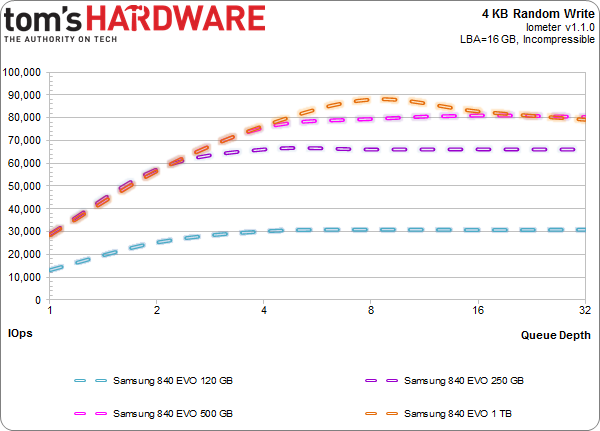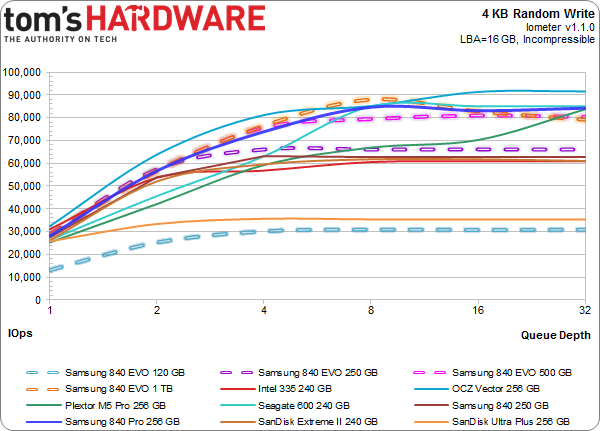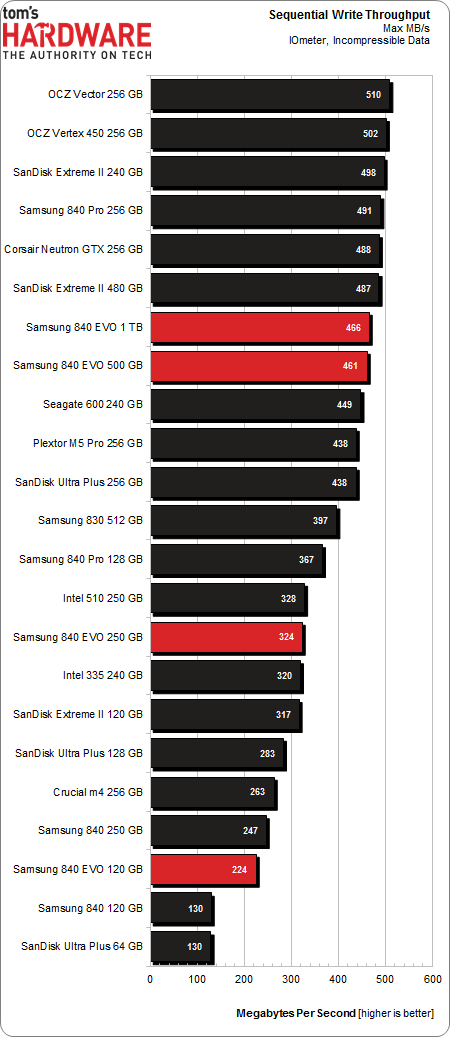Samsung 840 EVO SSD: Tested At 120, 250, 500, And 1000 GB
Last week, Samsung unveiled a successor to its wildly popular 840 at the company's Global SSD Summit in Seoul, South Korea. Stacked with a series of new features and 19 nm, three-bit-per-cell NAND, we benchmark four models and make a recommendation.
Results: 4 KB Random Writes
4 KB Random Write
The performance hit finally becomes apparent when we start ripping off 4 KB random writes. Samsung's 120 GB 840 EVO trails the rest of the crew, but then again it's only expected to hit 35,000 IOPS with a boost from Turbo Write. The 250 GB model plateaus with four outstanding commands. It does hit Samsung's specified target though, settling around 66,000 IOPS. Neither the 500 GB nor the 1 TB versions quite make it to 90,000 IOPS, though the largest configuration nearly gets there at a queue depth of eight.
Without question, random write performance is extremely important. Early SSDs didn't do well in this discipline, seizing up even in lightweight workloads. Newer drives proffer more than 100x the performance of solid-state storage from 2007. However, we also see a point of diminishing returns on the desktop.
It'd be easy to single out the 120 GB 840 EVO as the family's misfit. Just remember that it's only slow by comparison. In absolute terms, it still blows away the responsiveness of a mechanical disk.
Get Tom's Hardware's best news and in-depth reviews, straight to your inbox.
Current page: Results: 4 KB Random Writes
Prev Page Results: 4 KB Random Reads Next Page Results: Tom's Hardware Storage Bench v1.0-
Someone Somewhere Surely it would make sense to compare it to the vanilla SSD840. Also, there's no 840 Pro in the power charts.Reply
While the 1TB drive coming down to ~65c/GB is nice, seeing the 120 GB drives get near there would be nice. Especially since this is meant to be the value king. -
drwho1 I have 2 840 pro 512 GB SSD's (1 on my notebook 1 on my PC)Reply
I got them on a sale on Newegg for around $500 for both of them. :)
A 1TB would be cool if I find it on sale....
or maybe I should try out writing a letter to someone fat in some weird red costume...
-
slomo4sho The performance gap between the 840 Evo and 840 Pro is discouraging for the lower capacity models. I understand that the Pro is the flagship product but I was expecting less of a gap in in the 120GB models since this is a newer generation product and the 840 Pro is still based on the 21nm MLC NAND. However, the 1TB model is is a great choice for mass SSD storage. Lets hope the prices drop below $0.50 per GB soon.Reply -
Someone Somewhere MLC is faster than TLC, and bigger node NAND is usually faster. Only reason to go smaller is price and power.Reply -
SteelCity1981 I wonder if samsung plans on releasing a pro evo series since the regular series evo is to replace the older non pro versions.Reply -
razor512 ripoff, high prices for triple level flash especially at 19mm, the lifespan will likely suck and their shortened warranty represents that.Reply -
master9716 Cost for performance = Very High . ofcourse its not going to perform like a Pro but for the cost im amazed its that much better than the Regular 840.Reply -
J_E_D_70 Glad this review also refutes the perception of low TLC write endurance in normal desktop workloads. Been using a 128GB 840 in a daily-use desktop for eight months now and the endurance counter hasn't decremented at all. I'll have replaced the entire rig long before it wears out.Reply -
JohnnyLucky Interesting review. I think the point to remember is that the 840 EVO is not a high end enthusiast ssd like the 840 Pro. Instead, consider the 840 EVO as a mainstream ssd suitable for most consumer and home office scenarios.Reply


